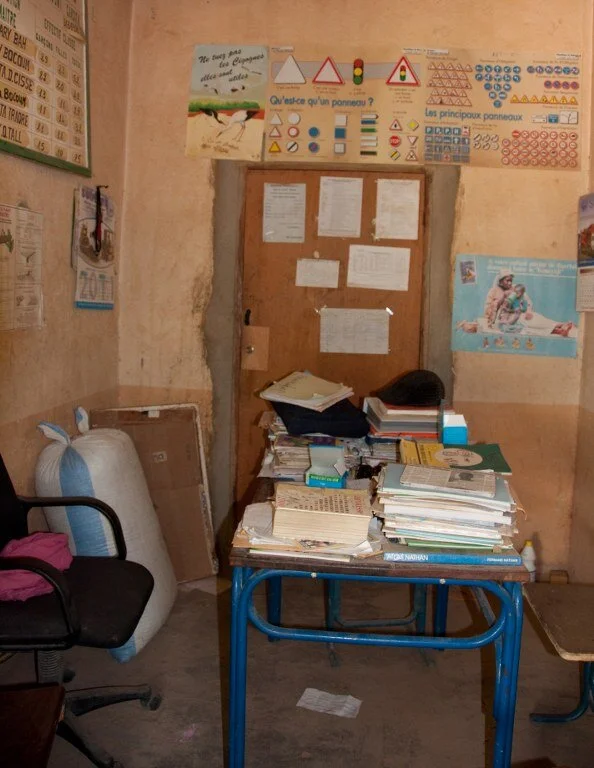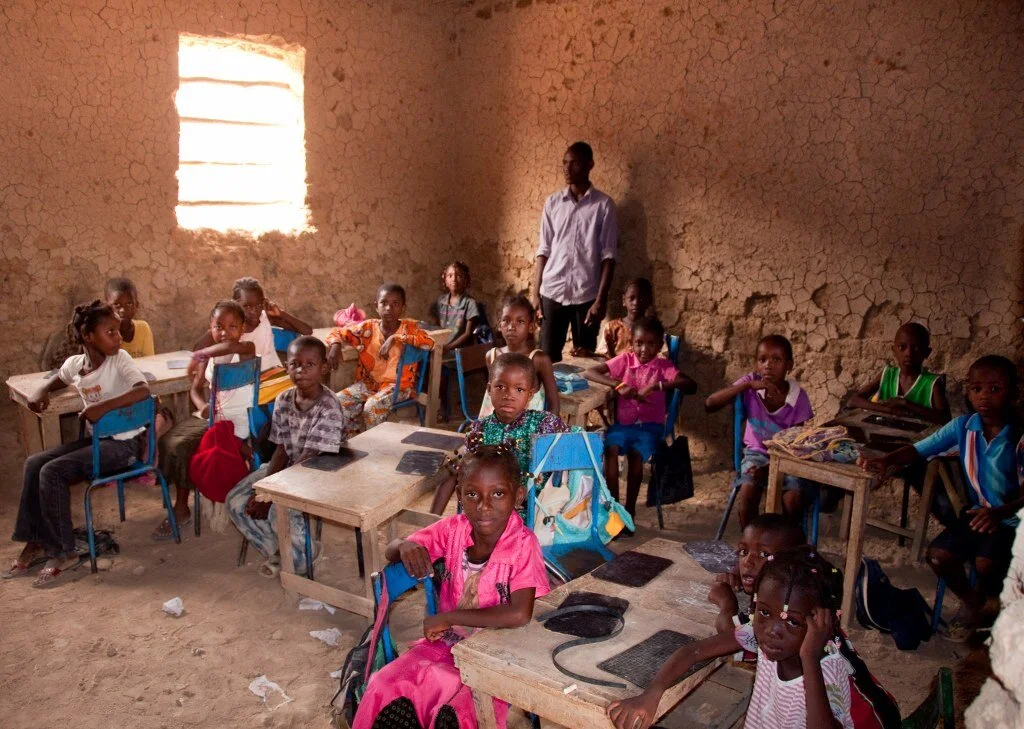DAY 44 – RETOUR BAMAKO
SYNOPSIS: A relatively uneventful trip from Mopti to Bamako. Therefore a few remarks about three schools I visited in Djenne and the unique syncretic Malian form of Islam.
Everything takes twice as long as my guidebook says. That was a good rule of thumb and proved to be true on my trip to Timbuktu as well as today. By 5:30 AM I was in a taxi to board a bus with the most reliable company around, according to Degedege. He was not wrong. There was a list of passengers. Luggage was marked with numbers and none of it was stored on top of the bus. No extra stops were made and nobody was piled into the aisles. I had not seen organization and discipline like this. And to top things off, every passenger was entitled to a bag of cool water! Literally a bag. Water is sealed in a plastic bag which people tear open with their teeth. And when they are done, they drop it. This makes for a huge amount of litter everywhere, and for the scarcity of bottles. Bottled water which I typically buy costs $1 and these bottles are coveted by children all over the country. But I digress…
After 6 hours we stopped in Segou. A 15 minute scheduled stop turned into a 1.5 hour layover as a tire had to be exchanged and one had to be taken off and fixed. But why my guide book calculated 6 hours for this ride and it took 13 is a still a mystery to me. The rest of the delay was likely caused by the condition of the roads; unfinished construction and erosion. But we were a well-behaved bunch of people sharing food, smiling at each other, and sitting comfortably in our assigned seats. A world apart from my trip from Bamako to Segou. A few kids and I exchanged glances and one jolly round fellow finally asked about my nationality: Alman-German. This answer always causes an enthusiastic response. Especially in the North of Mali Germany is funding various projects which the jolly guy immediately pointed out. A laudatory speech in French followed of which I only could make out certain key words. After that outburst of verbal exchange there was silence again; after all, we could not further communicate. And then about 10 minutes later from the back: “Meine Frau” sounded a mousy voice: “Ich spreche Deutsch”. “My woman, I speak German”.
That was a first in Mali. Nobody speaks German. You are lucky if you come across half-passable English. The woman turned out to be a teacher of German at a gymnasium in Mopti. I wish I had met her earlier. I would have loved to learn more about higher education in Mali. As is so typical in Mali, she gave me her name, full address, and phone number and expects the same from me even though we likely will never have contact again. Her name happened to be Cissé (see Blog Day 43). When I asked her (in German) if she was related to the politician in Mopti with the same name her answer was: I am not political… When I asked her how many more hours it would take to get to Mopti, she replied: Three months… In other words, her German leaves something to be desired, and we sat too far apart to make much of it. However, since there is nothing more to the ride, I will fill in some observations I made while visiting three schools in Djenne one afternoon:
School was already out for the summer holidays, but there were still three teachers and the chief administrator of the school, happy to show me around. The infrastructure of many public schools is pathetic: concrete rooms often with aluminum roofs (it must be like an oven in there!) are stuffed full of wooden benches. Classes with 40-50 people are considered small and 150 kids per classroom are not unheard of. What kind of education can go on under conditions like this is anyone’s guess. School is not mandatory but most kids go anyhow and like to go, since it’s a social and prestigious thing to do. Kids do learn basic reading, writing and math skills and are taught in three languages. Their own, at least one of the other local languages (for example if Bambara is their mother tongue then Fulani, or if the area is Tuareg speaking, then Bambara, Bozo, or Fulani and so on), and basic French. However, I was told that most people are not able to hold up their end of a complex conversation in French any better than I could.
Parents with an interest in actual learning will do anything to send their kids to private school. That sounds prestigious, but the private schools here are actually in even worse material shape than the public ones. Just about anyone can open a private school, if I believe Ishmael, the guide from Djenne. You then hire teachers, pay them a salary and have to secure a building. The main difference between private and public school is that class sizes are typically 20-30 per class. Kids most likely learn and they seem eager to do so. The drill method: teachers stating their wisdom and pupils repeating it in chorus still seems wide-spread even in private schools. Tuition is around $10 per pupil per month which is not enough to fix the rooms, buy supplies, or pay the teachers an appropriate salary. The system runs mainly on idealism. It showed – some of the rooms I saw made me wonder when the ceiling would come down on the kids. But both kids and teachers are driven by the desire to learn and to teach. The atmosphere in the private school seemed that of a close-knit group fueled by pride.
Koran Schools are in a class by themselves. A mahribu (scholar or imam) supervises a group of 10-20 boys who come from all over the country and often live with either the teacher or other locals. They learn the Arabic script and then copy the Koran until they have memorized it. Very few ever advance to the level of speaking and understanding Arabic and even fewer will advance to interpreting the Koran. Here as everywhere else in the Islamic world, memorization, and sounding out of the Koran is everything. The actual practice of Islam is based on what is transmitted through family, local imams (often still rooted in shamanism) and the general culture. That is how the curious and endearing hybrid of Islam and Animism develops and thrives in a place like Mali and ends up far removed from orthodoxy. And that is how Mali and fundamentalist Islam elsewhere come into conflict.
Good night.
















